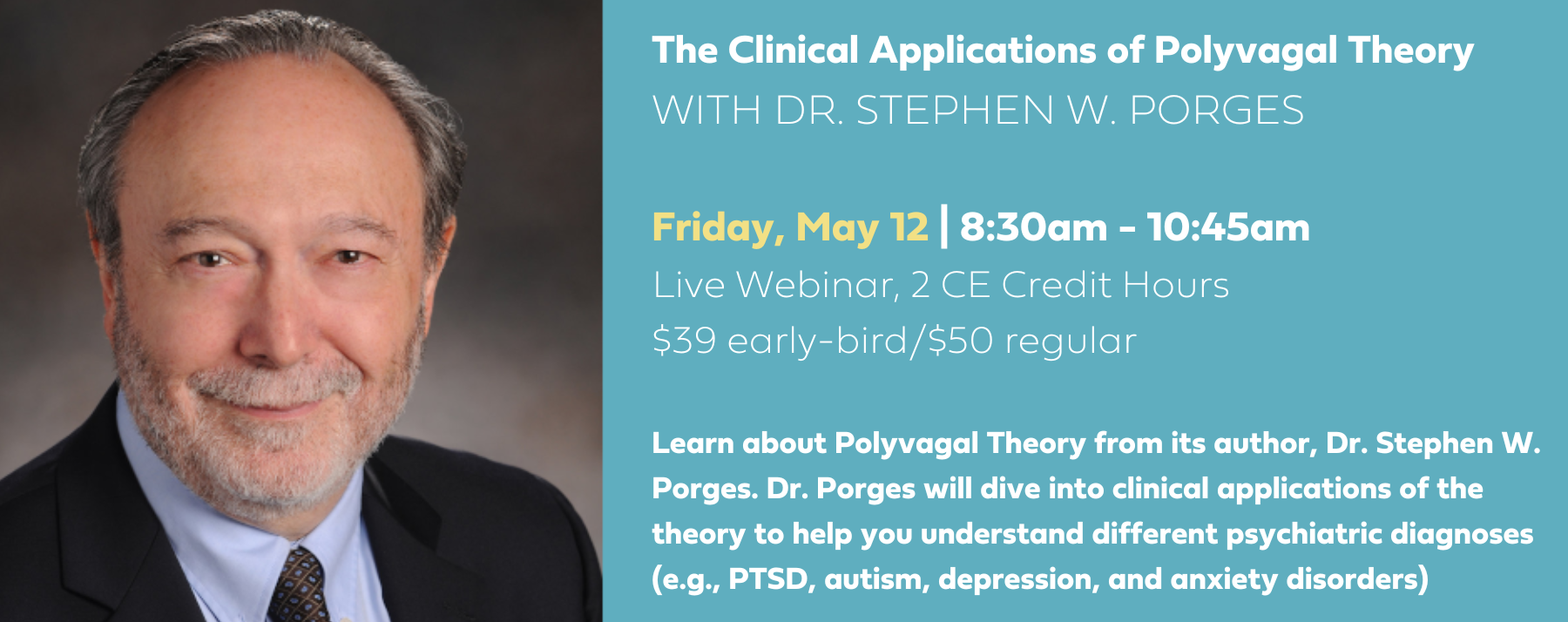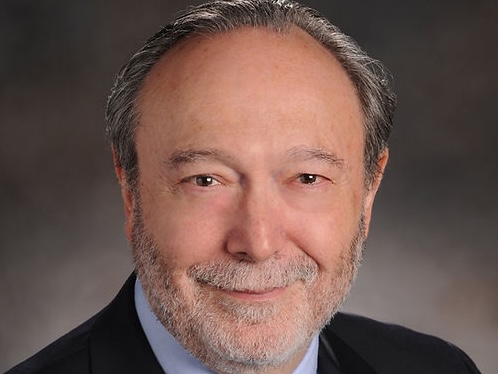
The Clinical Applications of Polyvagal Theory
With Dr. Stephen Porges
Description:
In this course, participants will learn about Polyvagal Theory from its author, Dr. Stephen W. Porges. Dr. Porges will dive into clinical applications of the theory to help you understand different psychiatric diagnoses (e.g., PTSD, autism, depression, and anxiety disorders). He will explain how neuroception, perception beyond conscious awareness, constantly scans the environment for cues of safety or threat which leads to a psychological response of calm and connected, mobilized and defensive, or immobilized and disassociated.
Another key component to understanding Polyvagal Theory is the Social Engagement System. Dr. Porges will break down this face-heart connection to show how bodily feelings are linked with facial expression, prosody, and other gestures. The Social Engagement System is integral on the path of healing and social connection and, without it being regulated, many behavioral and psychiatric disorders can present.
Polyvagal Theory has many implications in a clinical practice and in the daily lives of our clients. Dr. Porges will discuss common mental and physical health symptoms and how understanding Polyvgal Theory can help explain these comorbidities.
This webinar is designed to meet the continuing education needs of Psychologists, LMFTs, LCSWs, LPCCs, & LEPs and other mental health professionals.
Cost & Details:
Tuition: Fee: $39.00 thru April 28th, $50.00 thereafter.
You also have an opportunity to include a tax-deductable donation to The Maple Couseling Center.
Excluding the cost of the webinar, all amounts donated are tax deductible. The Maple Counseling Center is a tax exempt organization as described in Section 501(c)(3) of the Internal Revenue Code; EIN 95-2753118. Please consult with your tax advisor with any questions.
Class Schedule: Friday, May 12, 2023
8:30 - Introduction
9:30 - Break
9:45 - Part 2
10:45 - Conclusion
Access: Online via Zoom - the link will be provided to you. Be sure to register using the email address that you use to login to zoom as the link will only work with the specific address you register with.
Attire: Dress comfortably.
Tech Requirements: You will need a stable internet connection and the most recent version of Zoom Client for Meetings (available free here)
Tech Courtesy: We want your experience to be positive, so please:
- Log-in to the session a few minutes early.
- Mute your audio while in the conference sesson except when you are speaking.
- Submit questions via the chat feature.
- Limit chat submissions to workshop topics only.
This program qualifies for 2 CE Hours
Clicking the Register now button will take you into zoom to complete your enrollment and pay your fee. You will be asked to log in to Zoom. Be sure to add “noreply@zoom.com” to your email app’s trusted senders list to assure that confirmation and reminder emails go to your inbox.
You can also register by phone: 310.474.2505
Objectives:
In this interactive program, participants will learn how to:
1. Apply Polyvagal Theory to demystify several clinical symptoms related to psychiatric diagnoses (e.g., PTSD, autism, depression, and anxiety disorders).
2. Describe how specific circuits in the autonomic nervous system are related to social and defensive behaviors.
3. Discuss how a neural process, neuroception, evaluates risk in the environment and triggers adaptive neural circuits to promote either social interactions or defensive behaviors.
4. Explain how deficits in the regulation of the Social Engagement System relate to the core features of several behavioral and psychiatric disorders.
Presenter Bio:
Stephen W. Porges, Ph.D.

Stephen W. Porges, Ph.D. is Distinguished University Scientist at Indiana University where he is the founding director of the Traumatic Stress Research Consortium. He is Professor of Psychiatry at the University of North Carolina, and Professor Emeritus at both the University of Illinois at Chicago and the University of Maryland.
He served as president of the Society for Psychophysiological Research and the Federation of Associations in Behavioral & Brain Sciences and is a former recipient of a National Institute of Mental Health Research Scientist Development Award. He has published more than 400 peer-reviewed papers across several disciplines including anesthesiology, biomedical engineering, critical care medicine, ergonomics, exercise physiology, gerontology, neurology, neuroscience, obstetrics, pediatrics, psychiatry, psychology, psychometrics, space medicine, and substance abuse. In 1994 he proposed the Polyvagal Theory, a theory that links the evolution of the mammalian autonomic nervous system to social behavior and emphasizes the importance of physiological state in the expression of behavioral problems and psychiatric disorders. The theory is leading to innovative treatments based on insights into the mechanisms mediating symptoms observed in several behavioral, psychiatric, and physical disorders.
He is the author of The Polyvagal Theory: Neurophysiological foundations of Emotions, Attachment, Communication, and Self-regulation (Norton, 2011), The Pocket Guide to the Polyvagal Theory: The Transformative Power of Feeling Safe, (Norton, 2017), co-editor of Clinical Applications of the Polyvagal Theory: The Emergence of Polyvagal-Informed Therapies (Norton, 2018) and author of Polyvagal Safety: Attachment, Communication, Self-Regulation (Norton 2021). Dr. Porges is the creator of a music-based intervention, the Safe and Sound Protocol (SSP), which is used by therapists to improve social engagement, language processing, and state regulation, as well as to reduce hearing sensitivities.
Disclosure: The Lifespan Learning Institute and The Maple Counseling Center have implemented a process where everyone who is in a position to control the content of any educational activity must disclose any potentially relevant financial relationship with a commercial interest. The presenter listed above have been determined to be free of conflict for the purposes of this workshop.
Continuing Education Credit:
Continuing Education Credit: The Lifespan Learning Institute and Maple Counseling are cosponsors of this Continuing Education program.
Lifespan Learning Institute is approved by APA and CAMFT to offer Continuing Education Credit for our programs. Your eligibility for CE Credit is based upon the information contained in your Zoom Conference log-in/ log-out (recorded engagement time), post-test score, and completion of the online Evaluation form within 7 days after the end of the course. A certificate of completion will be emailed to those who met all the requirements on the 14th day after the course conclusion.
Psychologists (APA): Lifespan Learning Institute is approved by the American Psychological Association to sponsor continuing education for psychologists. Lifespan Learning Institute maintains responsibility for this conference and its content. This conference offers 2 hours of CE credit.
LMFTs, LCSWs, LPCCs, & LEPs (CAMFT): Lifespan Learning Institute is approved by the California Association of Marriage and Family Therapists to sponsor continuing education for LMFTs, LCSWs, LPCCs, & LEPs. Lifespan Learning Institute maintains responsibility for this program/course and its content. (Provider # 050085)
Communications: All pre-conference and post-conference communications will be via email or online. This includes but is not limited to: Registration confirmation, digital syllabus, Evaluations, CE certificates, etc.
Cancellations and Refunds: If Lifespan Learning Institute cancels or postpones a program, a full refund will be issued. If you need to cancel: Cancellation must be made in writing (by mail or by email) and received by Lifespan Learning Institute at least 10 days prior to the first date of the program. All cancellations are subject to a 20% cancellation fee.
Grievance Policy: Lifespan Learning Institute is fully committed to conducting all activities in strict conformance with the Ethical Principles of the APA & CAMFT. The full policy and filing procedure are available at LifespanLearn.org
Students with Disabilities: In accordance with the American with Disability Act (ADA), please contact our office (310.474.2505) at least 2 weeks before the program if you need special accommodations.
Sponsors:

The mission of Maple Counseling is to provide low-cost comprehensive mental health services to individuals of all ages, couples, and families, and to provide training for graduate and postgraduate students who are working towards licensure in the mental health field. Since its inception, in 1972, Maple Counseling has helped over 300,000 people receive critical mental health service. Maple Counseling provides programs and services to people of all ages, annually servicing over 7,700 individuals throughout all areas of Los Angeles County, and expanding to support all of California via telehealth. Maple offers ongoing counseling services in a safe space for adults through individual, couples, and group sessions, as well as to children, teens, and families, and provides psychiatric services through the Kapelovitz Psychiatry Program for eligible clients. In addition, Maple Counseling offers several community-based programs onsite at various schools including Community Circle, The Ted and Hedy Orden & Family Community-Based Preschool Mental Health Program, and School-Based Counseling Services that serve over 1,600 students a year.

